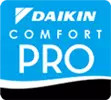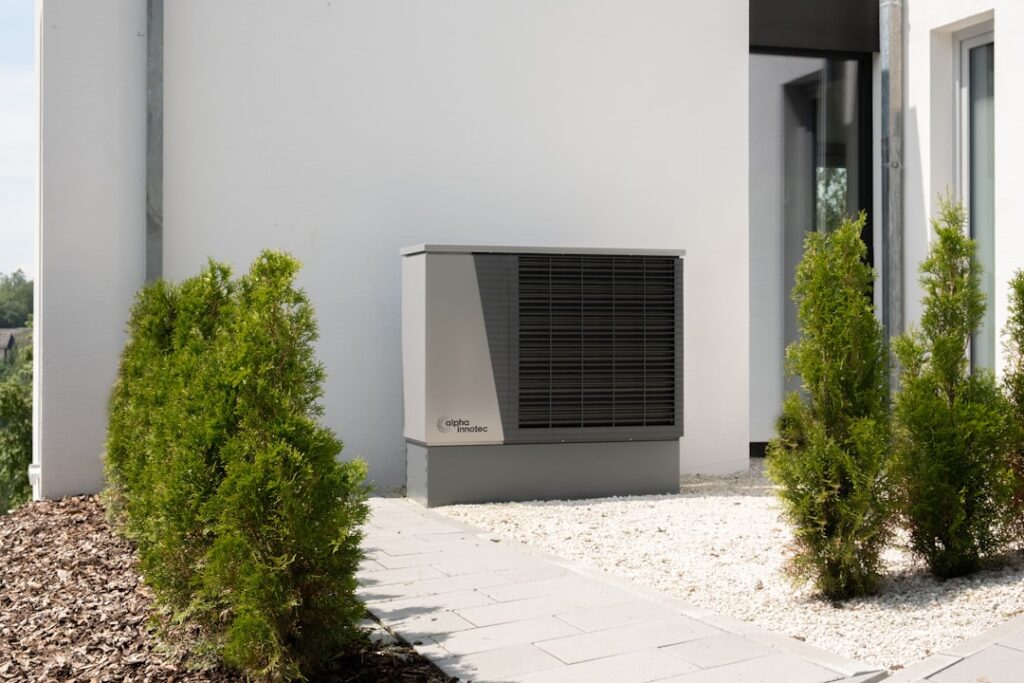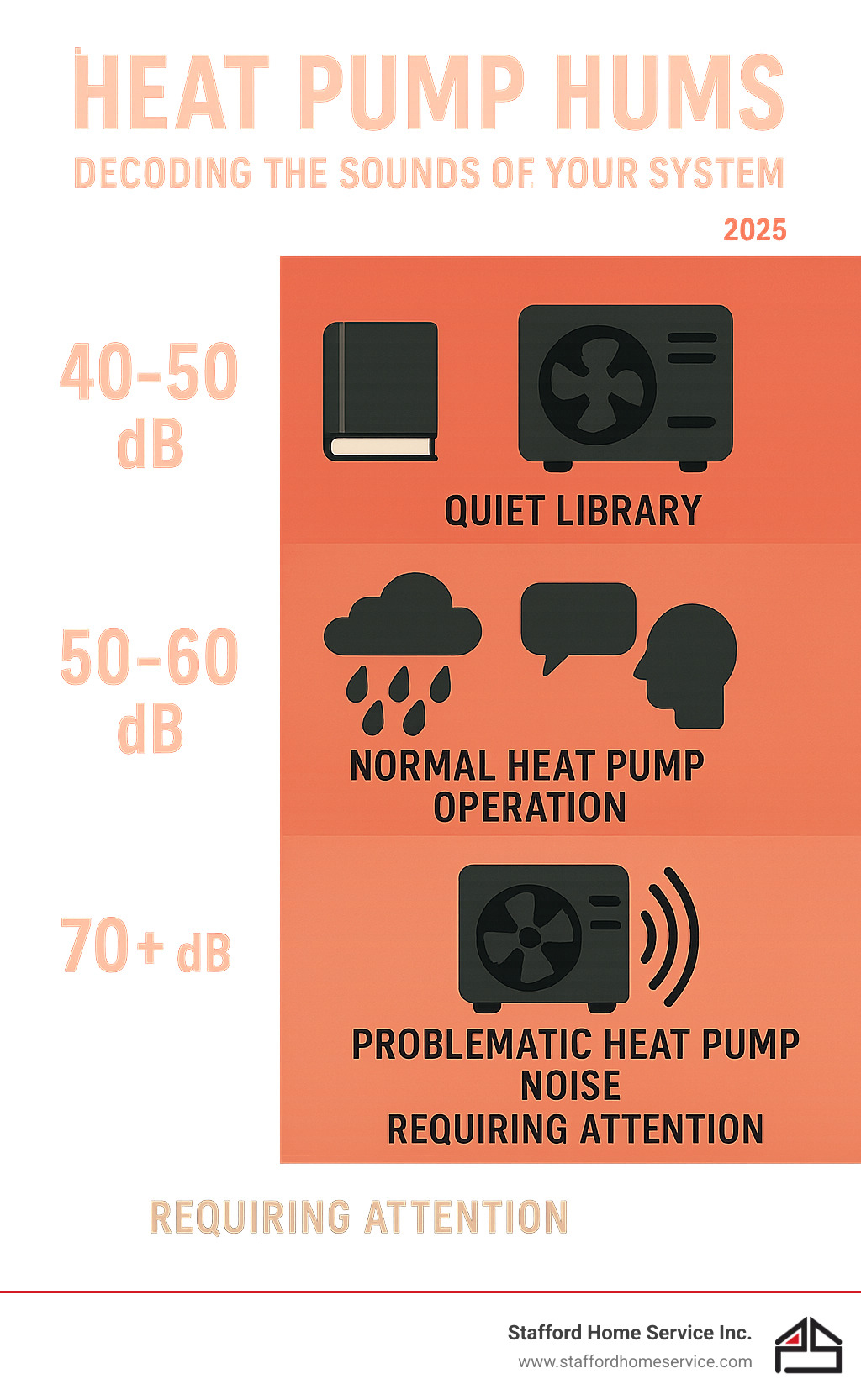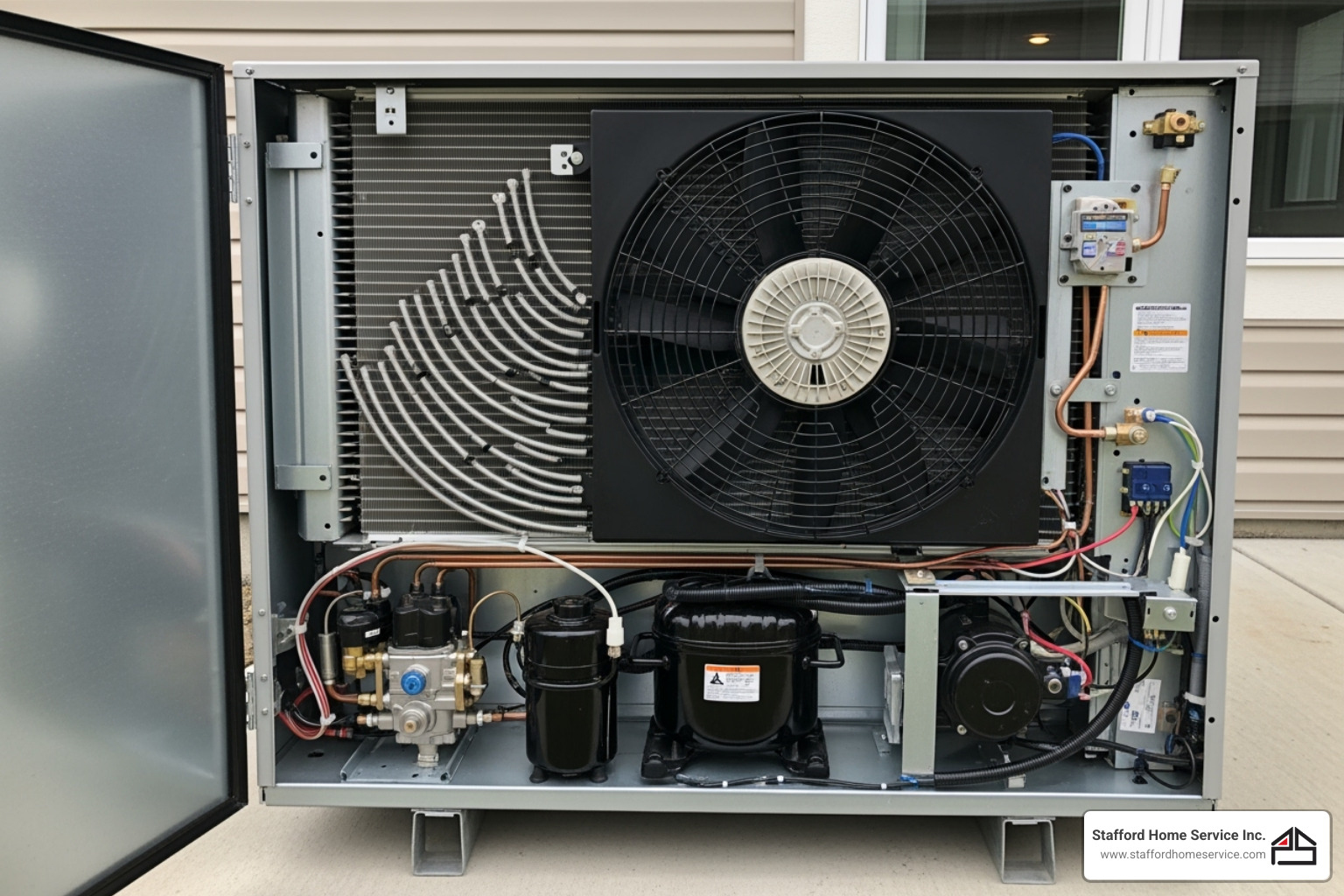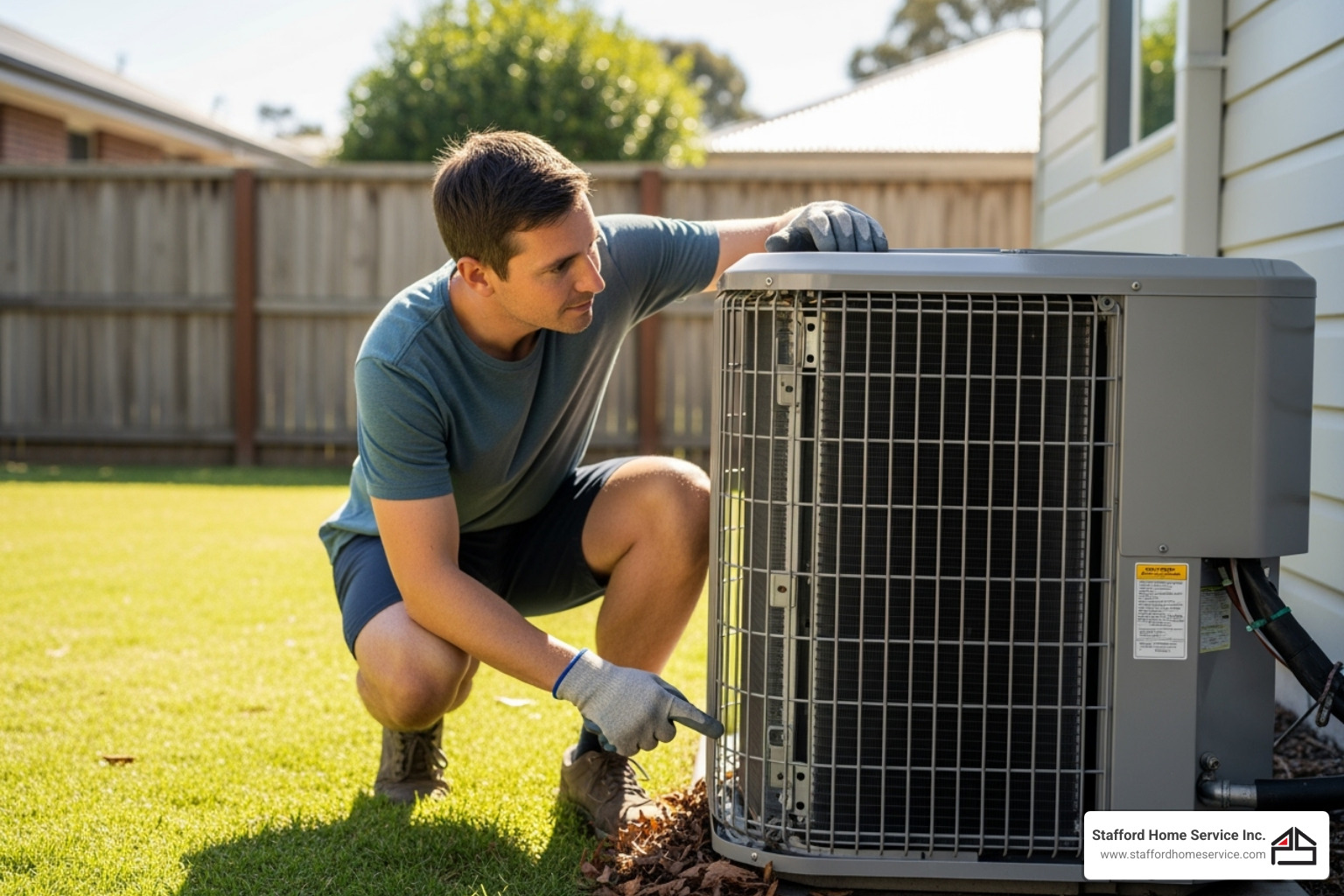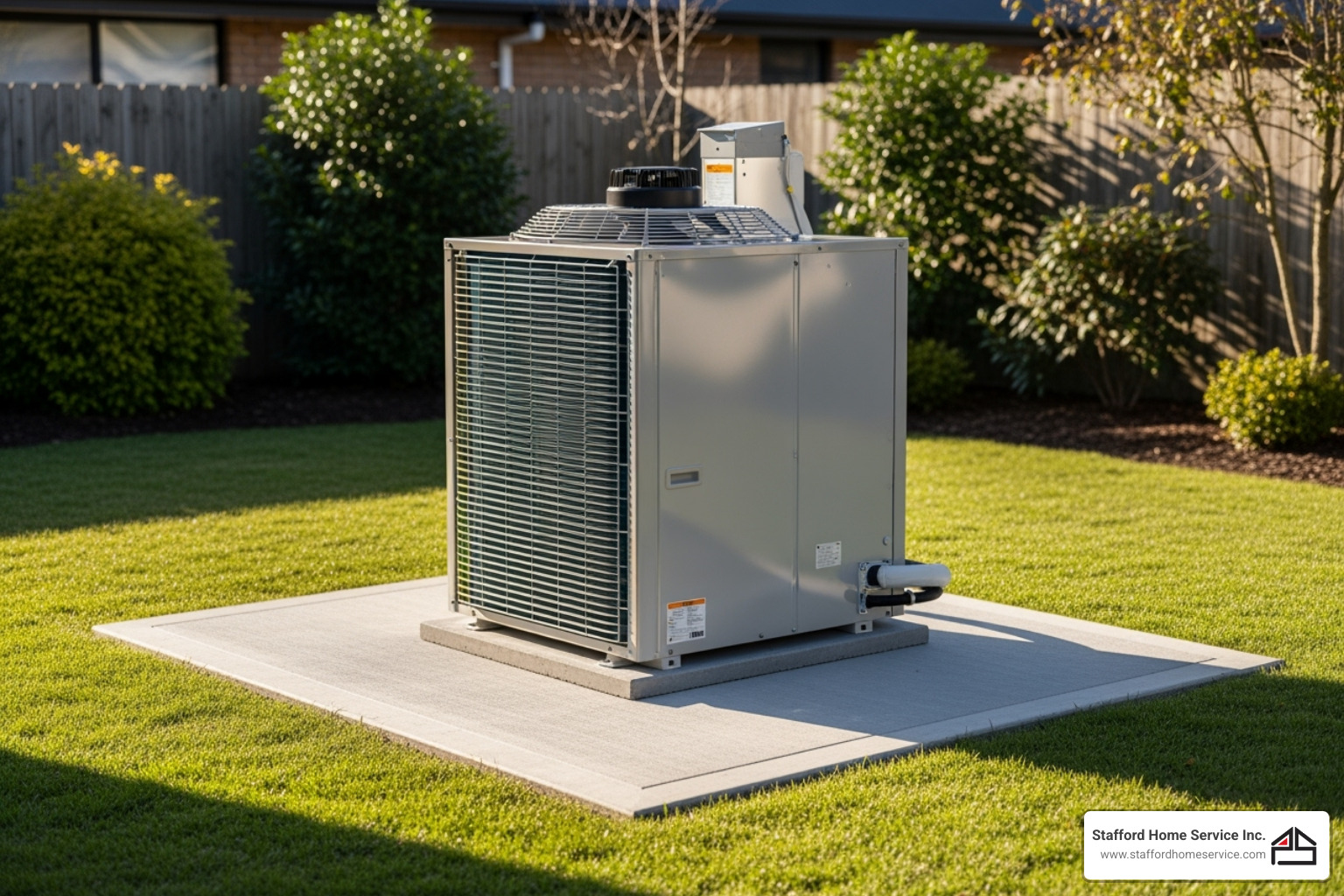Your Guide to Heat Pump Noises
A heat pump noisy system can be a source of constant worry. Understanding the sounds your heat pump makes is the first step to maintaining a quiet, efficient system.
Quick Answer for Heat Pump Noise:
- Normal sounds: Low humming (40-60 decibels), occasional clicking, whooshing during defrost.
- Problem sounds: Grinding, screeching, banging, rattling, hissing, or gurgling.
- Action needed: Clear debris, check filters, and call professionals for persistent unusual noises.
Most modern heat pumps operate around 60 decibels, similar to a normal conversation. While some operational sounds like humming, clicking, and whirring are normal, any change in sound could signal a problem. When familiar sounds become louder, more frequent, or completely different, your heat pump is sending an important message.
Ignoring unusual noises rarely makes them go away and often leads to more expensive repairs. The good news is that many noise issues have straightforward solutions, from simple DIY maintenance to professional service.
Decoding Your Heat Pump’s Soundtrack: Normal vs. Problematic Noises
A heat pump noisy concern often starts with one question: “Is that sound normal?” Learning to decode your heat pump’s auditory cues can help you distinguish between routine operation and a call for help.
| Sound Type | Normal Sound (Likely Meaning) | Problematic Sound (Likely Meaning) |
|---|---|---|
| Humming | Compressor and fan running smoothly | Electrical issues, failing motor, loose parts |
| Clicking | System cycling on/off | Electrical fault, relay issue |
| Whooshing | Defrost cycle (winter) | Airflow obstruction, refrigerant issue |
| Grinding | N/A | Worn motor bearings, debris in fan |
| Screeching | N/A | Worn fan motor belt, faulty bearings, compressor issues |
| Banging | N/A | Loose components, fan hitting obstruction |
| Rattling | N/A | Loose panels, debris, failing motor |
| Hissing | N/A | Refrigerant leak |
| Gurgling | N/A | Low refrigerant, air in lines, condensate drain issue |
Normal Operational Sounds
Most sounds from your heat pump are completely normal.
- Humming: The most common sound, a gentle, steady noise from the compressor and fan motor. A healthy unit hums at around 40-60 decibels.
- Clicking: Heard during startup or shutdown, this is the sound of electrical relays engaging and disengaging. It indicates the electrical components are working correctly.
- Whooshing: A soft swooshing noise common in winter when the heat pump enters its defrost cycle to melt ice from the outdoor coils.
These sounds are part of your heat pump’s efficient operation. Learn more in our guide on Heat Pump Systems for Efficiency.
Problematic Noises That Need Attention
When your heat pump noisy operation includes new or concerning sounds, it’s time to pay attention. These noises are warnings that can prevent bigger problems.
- Grinding, screeching, or squealing: These harsh sounds often signal worn motor bearings, a failing compressor, or a worn-out fan belt. They indicate a serious mechanical issue.
- Banging, rattling, or clanking: These noises suggest something is loose, like a panel or debris in the outdoor unit. It could also be a fan blade hitting an obstruction.
- Hissing or gurgling: These sounds usually point to refrigerant issues. Hissing often indicates a refrigerant leak, while gurgling can mean low refrigerant or air in the lines. These require immediate professional attention. For more details, see our guide on Signs Heat Pump Needs Refrigerant.
Unusual noises rarely fix themselves, so investigating them early is always the best course of action.
Why is My Heat Pump Noisy? Common Causes Explained
When your heat pump noisy operation disrupts your home, there’s always a reason. Most unusual noises stem from mechanical issues, electrical problems, or debris in the system. These sounds are your system’s way of communicating that something needs attention.
Rattling, Banging, or Clanking
These sounds often have straightforward causes.
- Loose components: Vibration can loosen screws, panels, or internal parts over time. A loose fan blade hitting the casing can create a loud banging sound.
- Debris accumulation: Leaves, twigs, or even small toys can get sucked into the outdoor unit, causing rattling or banging when the fan is running.
- Fan blade problems: A bent, cracked, or ice-obstructed fan blade can wobble or strike other components.
- Failing motor: Worn internal motor components can cause rattling or clanking as they struggle to operate smoothly.
Grinding, Screeching, or Squealing
These high-pitched sounds indicate serious friction within your system.
- Worn motor bearings: When the bearings that allow fans and compressors to spin smoothly wear out, they produce a distinct grinding sound.
- Worn-out belt: On older models, a worn or slipping belt can create a squealing noise, especially during startup.
- Compressor problems: Grinding or screeching can signal internal failure in the compressor, one of the most critical components. For related issues, see our guide on Heat Pump Mode Issues.
Hissing or Gurgling
These sounds usually point to problems with the refrigerant.
- Refrigerant leak: A hissing sound is the classic sign of pressurized refrigerant gas escaping from a hole or crack in the lines.
- Low refrigerant: Gurgling or bubbling can occur when the system is low on refrigerant (often due to a leak), causing it to move improperly.
- Air in refrigerant lines: Pockets of air mixed with refrigerant create turbulence and gurgling noises.
- Condensate drain issues: A blocked drain line can sometimes cause gurgling as water struggles to drain.
Why is my heat pump noisy in cold weather?
Winter can make any heat pump work harder and sound louder.
- Defrost cycle: To melt ice from the outdoor coil, the system reverses operation, creating whooshing, rattling, or even loud banging sounds as ice breaks free.
- Increased workload: Extracting heat from cold air is demanding, forcing the compressor and fans to run at higher speeds, which is naturally louder.
- Ice interference: Fan blades hitting ice buildup can cause alarming banging sounds during cold snaps.
- Compressor strain: Extreme cold puts more strain on the compressor, which can lead to louder humming or vibration.
While some increased noise in winter is normal, sudden or persistent sounds still warrant a check. Learn more about winter efficiency in our guide on Heat Pumps Energy Efficient Heating.
What You Can Do: DIY Troubleshooting and When to Call a Pro
When you have a heat pump noisy issue, you may be able to solve it yourself. However, safety is paramount. If you’re ever uncertain, call a professional. The wisest DIY step is knowing when not to DIY.
Simple DIY Troubleshooting Steps
Before investigating, turn off power to your heat pump at the thermostat and circuit breaker for safety.
- Check the air filter: A clogged filter restricts airflow, forcing the system to work harder and creating humming or whistling sounds.
- Clear the outdoor unit: Inspect the area around your unit for leaves, twigs, or other debris that could cause rattling. Clear away anything you can see, but don’t reach inside the unit.
- Inspect for loose parts: Gently check for loose panels or screws that could be vibrating. Also, ensure the unit is sitting level on its pad.
- Verify thermostat settings: Ensure your system is set to the correct mode for the season and has power.
- Check the condensate drain: If you hear gurgling indoors, check the condensate drain pan and line for clogs or standing water.
These simple checks can often resolve a heat pump noisy problem. For a full preventative routine, see our Heat Pump Maintenance Schedule.
Noise Reduction Solutions for Your Existing Unit
If your heat pump is healthy but loud, consider these solutions:
- Vibration-absorbing pads: Placed under the outdoor unit, these pads reduce vibrations transferred to your home’s foundation.
- Compressor sound blanket: This insulated wrap muffles the compressor, the noisiest component. This requires professional installation to prevent overheating.
- Sound barriers: Strategic landscaping or a fence can redirect noise away from living spaces, but ensure you don’t restrict airflow.
When to Call a Professional for a Heat pump noisy issue
Some situations require an expert. Attempting complex repairs can void warranties or create safety hazards. Call a pro if you notice:
- Persistent noises: If DIY troubleshooting doesn’t solve the issue, it’s time for a professional diagnosis.
- Grinding or screeching: These sounds almost always indicate serious mechanical problems like worn bearings or a failing compressor.
- Hissing sounds: This usually means a refrigerant leak, which is a hazardous material that requires certified handling.
- Poor performance: If noise is accompanied by poor heating/cooling or the system won’t turn on, it signals a significant failure.
Our technicians can identify the problem and advise on repair or replacement. For replacement guidance, see our guide on Heat Pump Replacement Richfield MN.
Proactive Quiet: Installation, Maintenance, and System Selection
The best way to deal with a heat pump noisy situation is to prevent it. Selecting the right system, ensuring proper installation, and performing regular maintenance are key to years of peaceful, efficient operation.
Choosing a Quiet Heat Pump System
When shopping for a heat pump, prioritize noise level along with efficiency.
- Check decibel (dB) ratings: Look for models in the 40-50 dB range for ultra-quiet operation, though most quality units operate around 60 dB.
- Consider variable-speed technology: These systems adjust their output to match your home’s needs, running longer at lower, quieter speeds instead of cycling on and off at full blast.
- Look for sound-dampening features: Some manufacturers include insulated compressors to muffle noise.
- Explore ductless mini-splits: These systems are often quieter than traditional ducted units.
Choosing the right system from the start is a great investment. Explore the Advantages of Installing a Heat Pump.
Best Practices for a Quiet Installation
Proper installation can make any system significantly quieter.
- Location: Place the outdoor unit away from bedrooms, patios, and neighbors’ living spaces. The City of Vancouver’s heat pump noise guide offers good advice on placement.
- Solid Foundation: Install the unit on a level concrete pad to prevent shifting and reduce vibration.
- Vibration Dampeners: Rubber pads between the unit and its base absorb vibrations, preventing them from traveling into your home.
- Isolate Lines: Ensure refrigerant lines and electrical conduits don’t touch your home’s structure, which can transmit vibrations indoors.
For expert installation that prioritizes quiet operation, our team specializes in Heat Pump Installation Bloomington MN.
How Regular Maintenance Prevents a Heat pump noisy problem
Regular maintenance is the best insurance against a noisy heat pump.
- Clean coils and components: Dirt and debris force your system to work harder, creating more noise.
- Lubricate moving parts: Proper lubrication prevents friction that leads to grinding and squealing.
- Tighten connections: A technician will tighten loose screws and bolts that can cause rattling.
Preventive maintenance stops small issues from becoming loud, expensive problems. As the U.S. Department of Energy emphasizes, regular maintenance is crucial for smooth operation. Following a consistent Heat Pump Maintenance Schedule ensures your system remains quiet and reliable.
Frequently Asked Questions about Heat Pump Noise
Here are answers to common questions about heat pump noisy concerns.
What are the normal sounds a heat pump makes?
A heat pump is not silent, but its normal sounds are unobtrusive. These include a low hum from the compressor and fan, occasional clicks during startup/shutdown, and a “whooshing” sound during the winter defrost cycle. A modern outdoor unit operates around 60 decibels, similar to a normal conversation, while indoor units are much quieter.
What types of noises indicate a problem with a heat pump?
Loud, sudden, or persistent noises are red flags. Sounds like grinding, screeching, banging, rattling, or hissing signal a problem that needs professional attention. Hissing often means a refrigerant leak, rattling can indicate loose parts or debris, and grinding usually points to failing motor bearings. Never ignore these sounds.
When is it more cost-effective to replace a noisy heat pump than repair it?
Consider replacement if your heat pump is over 10-15 years old, needs frequent repairs, or has a major component failure like the compressor. If a repair costs more than half the price of a new unit, replacement is often the better long-term investment. A new, energy-efficient model provides quieter operation, improved reliability, and lower energy bills, which are key benefits of modern heat pump systems. A trusted professional can help you weigh the options for your specific situation.
Trust the Experts with Your Heat Pump Needs
Understanding your heat pump’s sounds is key to maintaining a comfortable, quiet home. While gentle hums and clicks are normal, sounds like grinding, screeching, or rattling mean your heat pump noisy system is asking for help. These are early warning signals that can prevent more significant problems.
While DIY checks are useful, persistent or concerning noises require a qualified technician. What sounds like a simple rattle could be a serious issue like a refrigerant leak or failing compressor.
At Stafford Home Service Inc., our experienced technicians can diagnose any heat pump noise. We focus on finding the root cause to provide lasting solutions, not temporary patches. Our commitment to quality workmanship and complete customer satisfaction is backed by the Daikin Comfort Promise, ensuring your repair restores both efficiency and quiet operation.
Don’t let a noisy heat pump disrupt your life. Our team is ready to accurately diagnose the issue and restore peace to your home. For expert heat pump services in Minneapolis, MN, contact us today.

